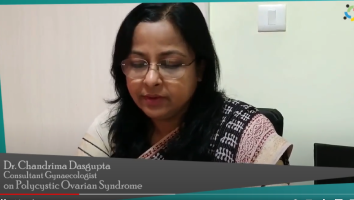What is an Ovarian Cyst?
Ovarian cyst is a medical condition in which the cysts or fluid-filled sacs or pockets start forming inside and over one’s ovary or ovaries. The female reproductive system consists of two ovaries. Their size is supposedly the same as that of an almond. Every month, unfertilized eggs or ova develop and mature in the ovaries till they are released in monthly cycles during the woman’s childbearing years
In most cases, ovarian cysts are painless. Many women with ovarian cysts do not have any signs. Ovarian cysts, in the majority of cases, do not require any treatment.
Free Doctor Assessment
Signs and Symptoms of an Ovarian Cyst
Many women do not know about the presence of cysts in their ovaries. However, in some cases, such as the presence of large size cysts, may cause the following symptoms:
- Pain in abdomen
- Swelling in the abdomen
- Vomiting and nausea
- Weakness
- Irregular menstrual cycle
- Abnormal vaginal bleeding
- Fast breathing
- Fever
If you have a fever, vomiting, or severe abdominal discomfort, seek medical help right away.
Endometriomas can cause a variety of symptoms, including:
- Painful periods
- Discomfort during sex
- Uncomfortable urine and bowel motions during periods
- Fatigue
- Nausea
- Diarrhea \constipation
- Infertility issues
Types of Ovarian Cyst
- Functional Ovarian Cysts: Follicle cysts and corpus luteum cysts are the two types of functional ovarian cysts. Follicular cysts are formed when a follicle fails to burst and instead fills with fluid. When the follicle ruptures to release the egg, it then closes up and swells with fluid, resulting in corpus luteum cysts. Cysts in the corpus luteum can be uncomfortable and cause bleeding. A hemorrhagic cyst is one in which there is bleeding in a functioning cyst.
- Complex Ovarian Cysts: Endometriosis, polycystic ovarian syndrome (POS), and other disorders may be linked to different types of ovarian cysts. Polycystic ovaries are characterized by excessively large ovaries with numerous tiny cysts on the outer borders.
Causes of Ovarian Cyst
The exact cause of ovarian cysts is still unknown but hormonal imbalances have been identified as one of the reasons.
- Functional cysts develop as a result of a little abnormality in your normal menstrual cycle, usually involving hormones.
- PCOS is a condition that results in a large number of tiny, uncomplicated ovarian cysts. Although the actual reason is unknown, it is believed to be due to a hormonal imbalance.
- Endometriomas are caused by endometriosis, a disorder in which cells from your uterine lining grow outside of your uterus, especially on your ovaries.
- When ovarian cells that have been altered begin to proliferate and replicate, cancerous cysts form.
Risk Factors of Ovarian Cyst
Some of the factors that increase the risk of forming ovarian cysts are:
- Endometriosis: Women with endometriosis are at high risk of developing an ovarian cyst. In this condition, the cells of the uterus reach other organs and start growing. If the cells spread the ovary and grow, they may make an ovarian cyst.
- Infertility treatment: In the treatment of infertility, the doctor induces ovulation in the ovary with the help of drugs. It may excessively stimulate the ovary. It results in the growth of ovarian cysts.
- Pregnancy: Pregnant women are at high risk of having ovarian cysts. It is due to the staying of ovulation in the ovary during pregnancy. In most cases, cysts occur during the second trimester.
- Hypothyroidism: Women with hypothyroidism are more likely to develop ovarian cysts.
- Tubal ligation: During surgery to prevent pregnancy, the doctor ties the fallopian tubes. It stops the egg from fertilization with the sperm. Females sterilized with this method have a high risk of ovarian cysts.
- Hormonal imbalance: Imbalance in the hormonal levels also increases the risk of ovarian cysts.
- Prior history: If the women already have ovarian cysts, they are at risk of developing more cysts.
- Smoking: Women who smoke have higher chances of getting ovarian cysts than women who do not smoke.
When to Consult a Doctor?
It is advised to all women to consult their gynecologists or doctors immediately if they are showing these signs:
- Pelvic or abdominal pain
- Fever with nausea and vomiting
- Fullness in the abdomen
- Abnormal menstrual cycle
- Heavy vaginal bleeding

Minimally Invasive
Surgery

World Renowned
Experts
EMI Facility
Available

Covid Safe
Environment
Diagnosis
The doctor may diagnose the ovarian cysts with the following methods:
- Pelvic examination: Ovarian cysts may cause swelling in the ovaries. The doctor determines the presence of an ovarian cyst through a pelvic exam by analyzing the swelling. He may then suggest the patient for imaging testing to confirm the presence of a cyst.
- Laboratory tests: In some cases, the doctor observes the change in cysts. If the cyst does not go or its size grows, the doctor may then advise laboratory tests. These include urine pregnancy tests, complete blood count, and urinalysis for kidney stones and urinary tract infections.
- Imaging methods: Various imaging techniques help to confirm the presence of an ovarian cyst. These include ultrasound, CT scan, and MRI. The doctor commonly uses ultrasound to detect the presence, number, type, and size of cysts. 3-dimensional ultrasound also has some advantages.
- Laparoscopy: The doctor may also use laparoscopy to diagnose and inspect the cyst. In laparoscopy, the doctor makes a small cut in the abdomen. Through this, he inserts a small tube with the camera and views the cysts.
- Cancer screening: After the ultrasound and laparoscopy, the doctor knows much about the type of cysts. If he finds that the cyst is solid and the women with cyst have a high chance of ovarian cancer, he suggests the cancer screening test.
Treatment
The doctor may treat the ovarian cyst through the following methods:
- Monitoring: In most cases, ovarian cysts do not require any treatment. The doctor will monitor the cysts for a few weeks. If the cysts do not disappear, shrink or become large, the doctor may suggest further treatment options.
- Medications: The doctor may prescribe several medications for ovarian cysts to reduce the pain and discomfort of the patients. These are pain-relieving medicines, such as diclofenac. The doctor may prescribe drugs to women with a high chance of repeated cyst formation. These drugs are birth control pills. They block ovulation and stop the formation of cysts. However, these drugs do not shrink the existing cysts.
- Surgery: In some cases, the cysts grow in size and cause pain. In these cases, the doctor may suggest surgery. The type of surgery depends upon the size and type of cyst. If the cyst is small, the doctor may advise laparoscopy. He makes a small cut, inserts the tube with the camera, and removes the cyst.
However, if the cyst is large, the doctor performs laparotomy. In this method, the doctor makes a large cut in the abdomen to remove the cyst. In some cases, the doctor suggests removing the complete ovary. This method is known as oophorectomy. The doctor sends the cyst to the laboratory for cancer evaluation. If the cyst is cancerous, the doctor may suggest removal of the ovary and fallopian tube.














